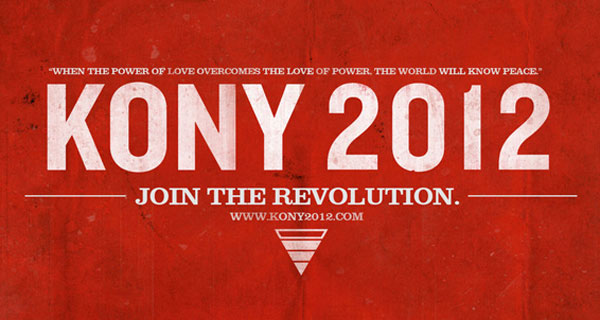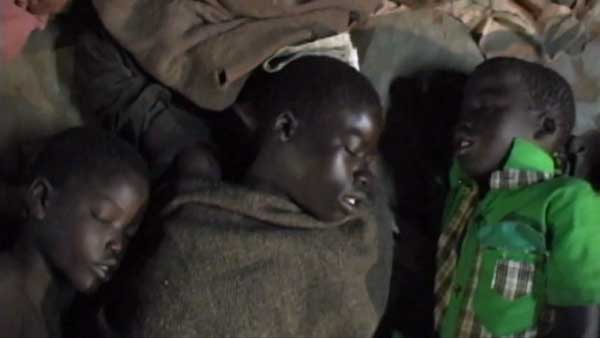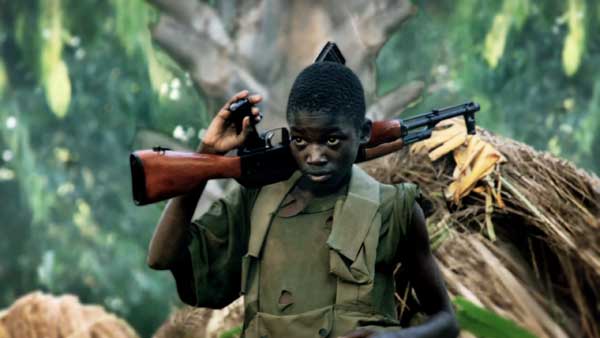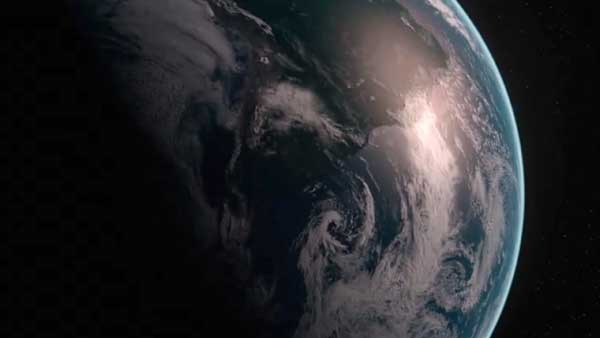JOSEPH KONY: WORLD’S WORST WAR CRIMINAL OR MEDIA SENSATION?
by one small seed on Mar 15, 2012 • 1:38 pm No Comments
image: vigilantcitizen.com
Kony 2012 is a film and campaign by Invisible Children that aims to make Joseph Kony famous, not to celebrate him, but to raise support for his arrest and set a precedent for international justice.’ This is the description under the Kony 2012 YouTube video, which has received more than 75 000 000 views in only a few days after it was made public. Jean-Paul takes a look at Kony 2012, questioning you to ask ‘Is Kony the world’s worst war criminal or more a media sensation?’
Until just recently most of us had not even heard of Joseph Kony, but now his misdeeds are amongst the choicest of topics. His rise to fame, or rather infamy, through the use of social media networks, has been so rapid and has sparked so many comments, that if you googled ‘Kony’ today you would have a hard time sifting the facts from opinion and conjecture. Everybody has something to say, and with so much chatter it is easy for the voices of those who are properly informed to get drowned out. The following article takes a look at the big picture and attempts to sort the facts from the chaff.
Kony 2012 is the name of a campaign and film that is being run by media-based charity group Invisible Children. Headed by Jason Russel, the non-profit organization released its film, Kony 2012, on 5 March. With its high-gloss pathos it quickly spread through Twitter, Facebook, and YouTube until every university student with a laptop or smartphone knew of the Kony 2012 cause. It looked like Kony 2012 was going to be an overnight success, but then Invisible Children came under scrutiny and some awkward questions were posed. Investigations revealed that some of their information had been misleading and that, after spending, only 30% of donations reached the people they were intended for. Soon there were hundreds of Kony videos on YouTube, some of which were posted by conspiracy theorists who sought to refute the claims made by Invisible Children in order to bolster their own sensationalistic speculations.
On the Kony 2012 website, Invisible Children has stated that Joseph Kony is the leader of the Lord’s Resistance Army, a rebel group which started in Uganda but now operates in South Sudan and the Democratic republic of Congo. It also stated that he has abducted 30 000 children and has displaced over two million people. It accuses the LRA of murder, rape, and the forced enlistment of children as soldiers. These facts have been confirmed by the African correspondents of several media networks. Invisible Children has also, however, claimed that Joseph Kony is the world’s worst war criminal. Since he is but one of many modern despots and Invisible Children’s claim is pure opinion, it can never be proven or refuted that he is the most terrible of all tyrants.

"Kony 2012" Video
Kony commentators now run the gamut from talk show hosts to political science students and from the rather ignorant to the well-informed. Even hactivist group, Anonymous, has taken a stance and has stated that, even though it stands by Invisible Children in their attempt to bring down Kony, it is suspicious of Invisible Children’s motives. Most of the criticism aimed at Invisible Children concerns its budget, transparency, and release of misinformation. Last year the organization spent $8 676 614, of which only 32% reached the people on the group. The rest was spent on staff, awareness, and filmmaking. They were also never subjected to external auditing which, with their poor budget plan, gets them only 2/4 stars with Charity Navigator, a charity evaluator.
Though this might cause dissatisfaction with supporters who have made donations, what irks me is their support for the Ugandan Army and how they have tried to portray themselves as purveyors of freedom and justice. On Kony 2012 posters and on Invisible Children’s website, the organization has referred to itself as the rescuers of Uganda. Also on their website is a photo of the founders of Invisible Children posing with weapons and soldiers belonging to the Sudan People’s Liberation Army. Both the Sudan People’s Liberation Army and the Ugandan Army have been accused of atrocities similar to those perpetrated by Kony and his forces. Invisible Children has stated their support for the Ugandan Army, which, in light of their goals, seems a little hypocritical. Still, I don’t believe that Invisible Children is funding a new terror campaign by the Ugandan Army.

image: communities.washingtontimes.com
While most observers and commentators take a relatively objective view of Kony 2012 and try to see both the good and bad in the campaign, there are also those who swing to one of the two extremes, though there are obviously more who choose to attack Invisible Children and its efforts. I have seen more than one YouTube video in which a self-proclaimed expert on African affairs claims that Kony 2012 is a scam or conspiracy aimed at ensuring U.S military intervention, involvement that would ensure access to Uganda’s oilfields. These individuals have said that Invisible Children claimed that Joseph Kony was still active in Uganda. Invisible Children said no such thing but stated that his forces are in the Democratic Republic of Congo and South Sudan, which, according to people on the ground, they are. One conspiracy theorist also claimed, with much authority and derision, that Kony has not been a threat for six years, even though experts think otherwise. What really alarms me is how public media, such as YouTube, allow such uniformed people to make their opinions known to so many people so easily.
This guy gives quite a ‘hearty’ opinion, one which is against Kony 2012 and sees it as pro-propaganda. Check it out…
Let me state the facts as reported by those in the know. Jose Kony is wanted by the International Criminal Court for war crimes. He has abducted 30 000 children and displaced over two million people in the last 26 years. He started the LRA in Uganda over six years ago but then moved his forces into what is now South Sudan and The Democratic Republic of Congo where he continues to spread terror. Invisible Children has been working on public support for the cause for nine years, and, in October 2011, Obama dispatched 100 troops to the region to help in the hunt for Kony. The search is still going on and there is currently no sign that the US task force is going to leave soon. It has also been reported that the threat of the LRA is lower than previo.ly perceived and that it probably only numbers in the hundreds. The LRA is only one of many problems in Central Africa and the war situation is more complex than Invisible Children makes it appear to be. Ugandans, especially, show astonishment at the attention that has been drawn to Joseph Kony, and cite the number of other problems afflicting the area.

image: communities.washingtontimes.com
Malaria, sleeping sickness, and HIV, have all killed more people than any African despot. Though less horrifying to all except those who deal with them, the pain they cause their victims is longer lasting and no-less acute. Disease, however, is not nearly as sensational as pangas and child soldiers, and will likely never see the kind of publicity that Kony has been granted. If viewers only want wars, Africa offers quite a menu. The continent has not seen peace since before the arrival of King Leopold II in the Congo. Some of the more newsworthy atrocities include Idi Amin’s massacres, the ’94 Rwandan genocide, the blood diamond-driven civil war in Sierre Leone, the oil-fueled conflict in Sudan, Apartheid, and the arms deals that followed the end of the Cold War, an exchange in which shiploads of arms were dumped on a continent whose warlords were just waiting for something that more reach than a big knife. Today they are still wars in 24 African countries including Angola, Chad, Ivory Coast, Democratic Republic of Congo, Eritrea, Nigeria, and Sudan. For more information see www.warsintheworld.com.
Still, people grow tired even of war. First the bloody scenes make the highlights. Depending on the public’s perceived interest level the story may be followed closely for a few weeks or even a few months, but, after that and as public interest wanes, it is given progressively less coverage until, finally, it is resigned to the African section, where it gets only an occasional mention. When images of the conflict in Dafur first reached the international community, we rallied together to bring an end to the fighting and suffering. People were fervent and optimistic, but like most African wars it was complicated, messy and drawn out. After several months people started losing interest and the media networks reacted by giving it less coverage. Several years later and even though it is no longer a full-out war, the conflict continues, but the once constant media coverage does not. Efforts were not in vain and much has changed, but things in the two countries are far from ideal. Problems like that in North and South Sudan require constant support even after we consider the issue to have lost its appeal. My question is what will we do once the Kony phenomenon blows over? Are we going to give ourselves a pat on the back once he has been brought to justice and leave it at that, or are we going to take a broader view of Africa and the problems that it faces?

"Kony 2012" Video
My suggestion is this: If you want to help, do so in one of the following ways. History has taught us that a country’s natural resources can be both a boon and its greatest source of misery. In those conflicts where natural resources such as blood diamonds and oil are at stake, pressure needs to be put on policy makers to make decisions that put the people in those countries first. Then it must be accepted that even after the right decisions are made, they are not always easy to implement. Wars in Africa spill across borders, and, on a continent as poor and desperate as Africa, violence and lawlessness easily become a way of life. If people want to make donations they should first do some research before giving money to a charity. Charity Navigator can help in identifying those charities that are making the biggest difference.
Kony parody from The Juice Media:
Invisible Children has raised awareness that is unprecedented, and in doing so has given us a model for future awareness campaigns, but the awareness of millions of college students, well intended as they are, is no longer going to make a significant difference in the campaign to bring down Kony. They were implemental in getting U.S forces into Uganda, and should be commended for doing so, but there is not much more they can do now. I argue that it would be better if they turn their attention to the hundreds of other causes in Africa. Not all of Africa’s problems exist in war zones, and it is quite possible to spend a few months to a year lending a hand to the charity workers who work tirelessly even after the cameras have been trained on other issues. There are many volunteer programs for those who want to give hands-on help, but, like charity organizations, some are better than others so do some research. People I know who have done this and have had a positive experience say that it was one of the most rewarding and memorable experiences of their lives.

"Kony 2012" Video
Lastly I ask that you question your sources. Be wary of a non-profit organization that puts itself on a pedestal. Charity and self-glorification are mutually self-exclusive. Social media networks are also not the place to get hard news. For informed opinions consult the experts. Every major media network has a foreign correspondent in Africa. Practice close reading. Invisible Children never intended to mislead people. It stated that Joseph Kony started the LRA in Uganda but moved his operations to South Sudan and the Democratic Republic of Congo six years ago. Some viewers only heard ‘Uganda’ and, without checking their facts, simply assumed that Invisible Children was trying to mislead them.
If there is anything we can learn from the Kony 2012 experiment it is the power of social media networks. The people that use these media to express their views need to start assuming responsibility and should do some careful research before making their opinions known to millions of viewers whose power of judgment might not equip them to make qualified decisions. I am not talking about Invisible Children, but the individuals who posted YouTube videos claiming that their country was going to use it as an excuse to invade Uganda and steal its oil. Such alarmists need to do their homework. Oil was discovered prior to 2009 and, since the 100-strong task force that Obama sent did not include any engineers, the U.S government hasn’t shown much interest in the country’s oil.

"Kony 2012" Video
Relevant links:
words: Jean Paul de Villiers
images: vigilantcitizen.com, cnn.com, chinasmack.com, communities.washingtontimes.com
video source: YouTube








